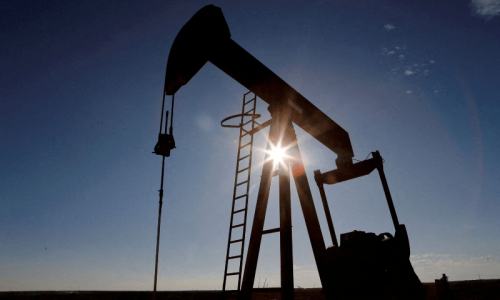KARACHI, Feb 23: As the fears of recession in the US sparks panic-selling in global equities with biggest rout in neighbouring China and India, many market gurus in the country are holding on to their stocks and instead selling the idea that the Pakistani capital market has already lost so much of value from its highest point, that there is not much room to fall further.
“Several studies show that Pakistan is not co-related with the Asian markets,” says Nadeem Naqvi, CEO at AKD Securities. He maintains that the US recession is not as much of an issue as the country’s political scene in the future; the reason being that Pakistani stock market has absorbed the political dishevel in the recent past and “retraced from its peak”. The KSE-100 index has lost about 1,100 points from 14,875 intra-days on Dec 28, 2007 to 13,787 points at close of market on Wednesday. “One of the major reasons that the international markets have taken such heavy beatings is that they were trading at very, very high multiples,” contend many stockbrokers. And as they say: “The greater the rise, the faster the fall”. The fact that trading on the Dalal Street in Mumbai had to be suspended for an hour to give it a cool-off period, after it opened 400 points down on Tuesday and the loss of more than 20 per cent in Indian Sensex and Japan’s Nikkei, spilled over for a brief moment into the KSE which started 200 points down but finished just 94 points off from the previous day, lends credence to the views of the stock strategists. Many analysts concur with the view.
SLOWDOWN OR RECESSION: That is the big question in debate everywhere including Davos. Digressing from the theme; “The Power of Collaborative Innovation”, world leaders at the World Economic Forum have been prompted to discuss the economic woes after this week’s worldwide market meltdown. The emergent Fed interest rate cut to 3.5 per cent on Tuesday had a soothing effect on the international markets including those in Asia. But with more than a trillion dollars stuck up in sub-prime mortgage; the slump in house prices; the curtailment in consumer spending are all too scary for world markets. An economist said that the official definition of recession is when the GDP growth is negative for two quarters or more. While no one has clear idea whether the world’s largest economy has gone into recession, a rather funny character on the CNN is seen pulling world leaders and corporate bosses at Davos and handing them a piece of chalk to choose between “slowdown” or “recession”. A glance at the board in the afternoon showed an even number of ticks on both sides.
IMPACT ON PAKISTAN MARKET: “Relatively speaking, minimal,” says an economist, who asked not to be named. And many others believed that the impact of the avalanche would be felt worldwide, though the gravity would differ from country to country. On such counts as the US being Pakistan’s biggest trading partner and much of the remittances and foreign investment (both direct and portfolio) flowing from that country, the economy and markets here could barely brush off the repercussions. But given the small ratio of exports to GDP compared to other bigger Asian economies such as India and China, the blow might be bearable until the world economic managers find something more than the interest rate cut, to put a floor under the fall towards recession. As regards Pakistan’s equity markets, no one is likely to see as huge outflow of portfolio investment as perhaps is feared in India, for the simple reason that there is nothing to flow out from our markets. “Much of the foreign portfolio investment had already drained out during the political chaos in the country in the last couple of months,” says Mr Naqvi. He maintains that due to the global slump in markets, Pakistani stocks have become extremely attractive. Giving a return on equity (ROE) of 35 per cent compared to average of 16-18 per cent by other Asian markets; price-to-book value of 2.4 times as against 2.7 times and trading at price-to-earnings (p/e) multiple of 10 times future earnings, in relation to Asian markets’ p/e at 15 times, the KSE should be more visible on the foreign fund manager’s radar screens, now than before. “If it were not for the political uncertainty surrounding the country over the Feb 18 elections and thereafter, Pakistan would have been a haven for investors all across the globe,” says Mr. Naqvi.













































Dear visitor, the comments section is undergoing an overhaul and will return soon.